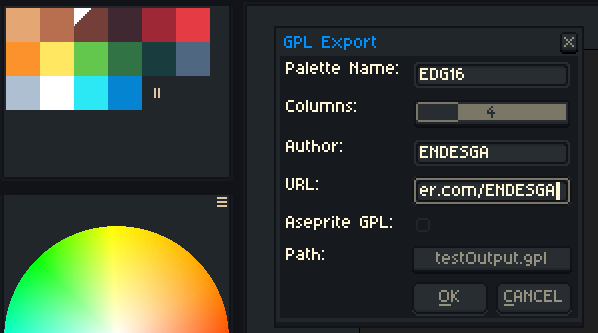Hi folks,
I wanted palettes to export to GPLs with more information than the Aseprite default. I wrote this script, thought I’d share.

In case the screen cap is misleading, this does not read any metadata from an existing palette. Afaik that’s not available from the palette object. I typed those in manually.
local defaults = {
palName = "Palette",
columns = 0,
attribName = "Anonymous",
attribUrl = "https://lospec.com/palette-list",
useAseGpl = false
}
local dlg = Dialog {
title = "GPL Export"
}
dlg:entry {
id = "palName",
label = "Palette Name:",
text = defaults.palName,
focus = false
}
dlg:newrow { always = false }
dlg:slider {
id = "columns",
label = "Columns:",
min = 0,
max = 16,
value = defaults.columns
}
dlg:newrow { always = false }
dlg:entry {
id = "attribName",
label = "Author:",
text = defaults.attribName,
focus = false
}
dlg:newrow { always = false }
dlg:entry {
id = "attribUrl",
label = "URL:",
text = defaults.attribUrl,
focus = false
}
dlg:newrow { always = false }
dlg:check {
id = "useAseGpl",
label = "Aseprite GPL:",
selected = defaults.useAseGpl
}
dlg:newrow { always = false }
dlg:file {
id = "filepath",
label = "Path:",
filetypes = { "gpl" },
save = true
}
dlg:newrow { always = false }
dlg:button {
id = "ok",
text = "&OK",
focus = defaults.pullFocus,
onclick = function()
local activeSprite = app.activeSprite
if activeSprite then
local args = dlg.data
-- Cache functions.
local min = math.min
local max = math.max
local strfmt = string.format
-- Unpack arguments.
local palName = args.palName or defaults.palName
local columns = args.columns or defaults.columns
local attribName = args.attribName or defaults.attribName
local attribUrl = args.attribUrl or defaults.attribUrl
local useAseGpl = args.useAseGpl
-- Validate arguments.
palName = palName:sub(1, 64)
columns = max(0, min(16, columns))
attribName = attribName:sub(1, 64)
attribUrl = attribUrl:sub(1, 96)
local gplStr = strfmt(
"GIMP Palette\nName: %s\nColumns: %d\n",
palName, columns)
-- https://github.com/aseprite/aseprite/
-- blob/main/docs/gpl-palette-extension.md
if useAseGpl then
gplStr = gplStr .. "Channels: RGBA\n"
end
if attribName and #attribName > 0 then
gplStr = gplStr .. strfmt(
"# Author: %s\n",
attribName)
end
if attribUrl and #attribUrl > 0 then
gplStr = gplStr .. strfmt(
"# URL: %s\n",
attribUrl)
end
local colorSpace = activeSprite.colorSpace
if colorSpace and #colorSpace.name > 0 then
gplStr = gplStr .. strfmt(
"# Profile: %s\n",
colorSpace.name)
else
gplStr = gplStr .. "# Profile: None\n"
end
local pal = activeSprite.palettes[1]
local palLen = #pal
gplStr = gplStr .. strfmt(
"# Colors: %d\n",
palLen)
local palLenn1 = palLen - 1
for i = 0, palLenn1, 1 do
local aseColor = pal:getColor(i)
-- The Color constructor allows for values
-- beyond the range [0, 255]; the rgbaPixel
-- getter uses modular, not saturation, arithmetic.
-- Shouldn't be a problem in most cases, but
-- being conservative here.
local r = max(0, min(255, aseColor.red))
local g = max(0, min(255, aseColor.green))
local b = max(0, min(255, aseColor.blue))
if useAseGpl then
local a = max(0, min(255, aseColor.alpha))
local hexAbgr = (a << 0x18)
| (b << 0x10)
| (g << 0x08)
| r
gplStr = gplStr .. strfmt(
"%3d %3d %3d %3d 0x%08x",
r, g, b, a, hexAbgr)
else
local hexRgb = (r << 0x10)
| (g << 0x08)
| b
gplStr = gplStr .. strfmt(
"%3d %3d %3d %06X",
r, g, b, hexRgb)
end
if i < palLenn1 then
gplStr = gplStr .. '\n'
end
end
local filepath = args.filepath
if filepath and #filepath > 0 then
local ext = filepath:sub(-#"gpl"):lower()
if ext ~= "gpl" then
app.alert("Extension is not gpl.")
else
local file = io.open(filepath, "w")
file:write(gplStr)
file:close()
end
else
app.alert("Filepath is empty.")
end
dlg:close()
else
app.alert("There is no active sprite.")
end
end
}
dlg:button {
id = "cancel",
text = "&CANCEL",
onclick = function()
dlg:close()
end
}
dlg:show { wait = false }
Feel free to modify. I believe that the string formatting options for Lua match those of C++.
Here is a link to a version of the GPL export script in a Github repo (in case I find bugs I need to fix or decide to bloat the script with more features in the future  ).
).
An output file for EDG16 looks like this:
GIMP Palette
Name: EDG16
Columns: 4
# Author: ENDESGA
# URL: https://twitter.com/ENDESGA
# Profile: sRGB
# Colors: 16
228 166 114 E4A672
184 111 80 B86F50
116 63 57 743F39
63 40 50 3F2832
158 40 53 9E2835
229 59 68 E53B44
251 146 43 FB922B
255 231 98 FFE762
99 198 77 63C64D
50 115 69 327345
25 61 63 193D3F
79 103 129 4F6781
175 191 210 AFBFD2
255 255 255 FFFFFF
44 232 244 2CE8F4
4 132 209 0484D1
If an Aseprite gpl is selected, then a sample of the difference in output is like this
228 166 114 255 0xff72a6e4
184 111 80 255 0xff506fb8
116 63 57 255 0xff393f74
There are four columns instead of three; alpha is the fourth number. The hexes are formatted as they would be in a Lua script: AABBGGRR with the ‘0x’ prefix for hexadecimal literal.
GIMP Palette
#
228 166 114 Untitled
184 111 80 Untitled
116 63 57 Untitled
A sample from the built-in save palette output looks like the above.
Best,
Jeremy